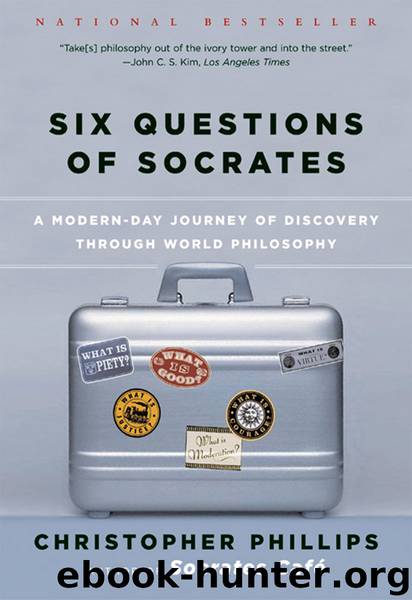Six Questions of Socrates by Christopher Phillips

Author:Christopher Phillips
Language: eng
Format: epub
Publisher: W. W. Norton & Company
Published: 2004-05-02T16:00:00+00:00
NOT-SO-ORDINARY VIRTUES AND HUMAN GOOD
Scholar Robert Gordon writes that Primo Levi enumerated over his writing life a “category of virtues” that were unique in their “rather stubborn ordinariness”—virtues that steer away from “the ‘heroism’ of classical notions” of virtue, and instead affirm “ordinary life—the life of marriage, the family, and the home, of work and production.” He says Levi makes this the “proper center of moral life…, of notions of dignity and integrity, rather than…the banal backdrop against which the self struggles to a higher ideal.”
Gordon maintains that to Levi, ordinary virtues are “beyond heroism, politics, and even history,” because even the Holocaust, with its unprecedented “system which cut its victims out of public history, precluded the dynamics of politics, war, or heroism,” did not lead to their extinction. But I don’t think that this makes these virtues in any way “beyond heroism or politics or history,” but rather even more heroic, and even more integral to history and politics. Those who consistently practice so-called ordinary virtues tend to be extraordinarily rare, and their efforts serve as a beacon for anyone trying to become more fully human.
For Levi, there is no single set of ordinary virtues. In his book La Tregua, he writes that “we all build our own” set of virtues “in the wake of our experiences or those of others we have taken on board” and what distinguishes them as ordinary is where they are practiced, such as the home and workplace. To Levi, no list would ever be definitive, but rather, for each person, it would be somewhat “homemade, eccentric.” But to isolate these virtues in the more mundane spheres of our lives diminishes them. There were all too many in the Nazi era who were adept practitioners of these ordinary virtues at home, yet took part without a twinge of remorse in heinous atrocities elsewhere—the latter negates, and makes a mockery of, the former. Surely these ordinary virtues, in order to be genuinely ordinary, must permeate all spheres of one’s life in order to realize the human good of which the students spoke. Levi himself is a paradigm of such a person.
According to Gordon, Levi, in his search for ordinary virtues, did find that even though there is no definitive list, some virtues tend to recur, and could be called universal: “acknowledgement, attention, attentiveness, care (attending to), patience, listening, dialogue, sensitivity, a sense of proportion and perspective, an ability to see and draw lines of connection,” as well as the “virtue of listening,” and “all forms of apt or right looking.” Most of all, to Levi, the “characteristic…nature” of any set of ordinary virtues is that they are permeated by the “dynamics of human acknowledgement,” as opposed to “the degraded and denied looking of the camp world” of the Holocaust. To fail to see any longer a human face—“to be faceless”—is “to deny and be denied one’s very essence, to be denied even the slimmest chance of survival or of life embodied in the ethical ‘eye
Download
This site does not store any files on its server. We only index and link to content provided by other sites. Please contact the content providers to delete copyright contents if any and email us, we'll remove relevant links or contents immediately.
The remains of the day by Kazuo Ishiguro(8965)
Tools of Titans by Timothy Ferriss(8360)
Giovanni's Room by James Baldwin(7315)
The Black Swan by Nassim Nicholas Taleb(7098)
Inner Engineering: A Yogi's Guide to Joy by Sadhguru(6784)
The Way of Zen by Alan W. Watts(6591)
Asking the Right Questions: A Guide to Critical Thinking by M. Neil Browne & Stuart M. Keeley(5751)
The Power of Now: A Guide to Spiritual Enlightenment by Eckhart Tolle(5742)
The Six Wives Of Henry VIII (WOMEN IN HISTORY) by Fraser Antonia(5493)
Astrophysics for People in a Hurry by Neil DeGrasse Tyson(5172)
Housekeeping by Marilynne Robinson(4433)
12 Rules for Life by Jordan B. Peterson(4298)
Double Down (Diary of a Wimpy Kid Book 11) by Jeff Kinney(4257)
The Ethical Slut by Janet W. Hardy(4240)
Skin in the Game by Nassim Nicholas Taleb(4232)
Ikigai by Héctor García & Francesc Miralles(4232)
The Art of Happiness by The Dalai Lama(4120)
Skin in the Game: Hidden Asymmetries in Daily Life by Nassim Nicholas Taleb(3986)
Walking by Henry David Thoreau(3950)
